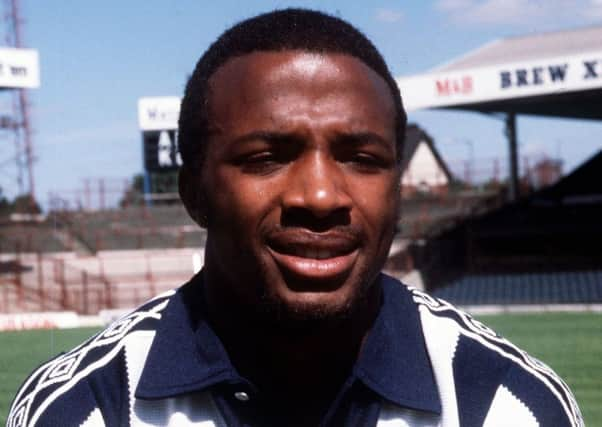Obituary: Cyrille Regis, footballer, England internationalist, coach and agent


In many ways, Cyrille Regis lived every young footballer’s dream. In many ways, he did not. Born in the rural town of Maripasoula in French Guiana in February 1958, Regis moved with his family to west London at the age of five to a city where families seeking housing would often be greeted by signs which read: “No Blacks, No Irish, No Dogs.”
It was a tough upbringing and dreams of a career in football appeared to have eluded him when the trials he craved failed to materialise.
Advertisement
Hide AdAdvertisement
Hide AdUrged by his father Robert, a labourer, to get a trade under his belt and give himself the best chance in life, he left school after completing his exams to become an apprentice electrician.
Football, however, remained part of his life and would belatedly earn him fame, relative fortune and much more besides.
It was John Sullivan, chairman of non-league Molesey, who spotted his potential as a 17-year-old one Sunday morning in Regent’s Park, and then top-flight West Brom who took a chance on him after his impressive displays for the Surrey side and Hayes prompted them to invest £5,000 in his services in May 1977.
Scout Ronnie Allen, who was later to take over as Baggies manager, was so convinced by the teenager he offered to pay the fee himself and his faith was richly rewarded.
A bull of an old-fashioned centre-forward, Regis took to the professional game in impressive style, scoring twice on his debut in a League Cup tie against Rotherham and then claiming his first league goal against Middlesbrough three days later.
In all, he would make 297 appearances for the Baggies and score 112 goals, but his time at the Hawthorns was far more significant, and not just for the midlands club.
Laurie Cunningham was already at West Brom when Regis arrived and the addition of Brendon Batson the following year led to the trio of black players being nicknamed ‘The Three Degrees’, and their contribution is soon to be commemorated by a statue outside the stadium.
Like other black players at the time, they were subjected to persistent racist abuse – bananas were routinely thrown on to pitches in their direction – but they helped to blaze a trail for those who were to follow.
Advertisement
Hide AdAdvertisement
Hide AdNamed the PFA’s Young Player of the Year for 1978, Regis went on to become just the third black England international as he followed in the footsteps of Viv Anderson and Cunningham – the first black player to represent England at under-21 level – winning the first of five senior caps against Northern Ireland in 1982.
However, his elevation did not meet with universal approval, as he later revealed in his autobiography, My Story.
He wrote: “Clearly someone didn’t approve of my selection because they had cut out individual letters from a newspaper and stuck them on a sheet of paper to spell out a message that read, ‘If you put your foot on our Wembley turf, you’ll get one of these through your knees’.
“I looked back into the envelope and there was a cotton wool pad wrapped round something. I took it out, opened it up and there it was. A bullet staring up at me.”
In that same 1981-82 campaign his FA Cup strike against Norwich – a thunderous shot after a characteristic turn and powerful run – was named goal of the season.
He left the Hawthorns for Coventry in a £250,000 switch in 1984 and scored 62 times in 274 appearances. He was memorably part of the Sky Blues team which lifted the FA Cup in 1987.
He had spells at Aston Villa, Wolves, Wycombe and Chester as his playing career drew to a close and following his retirement, spent four years on the coaching staff at the Hawthorns before becoming an agent, a job he carried out until his death.
Regis will remembered for what he did on the football pitch, but perhaps more so because of the climate in which he did it, but he was more than just a footballer.
Advertisement
Hide AdAdvertisement
Hide AdBorn into a Christian family, he turned to his faith once again as an adult after the death of close friend Cunningham in a car crash in July 1989, two years after the pair had walked away from a similar accident.
“I have learned that money cannot buy peace of mind so I simply tell people how I found hope and peace in God,” he said.
He was a trustee for Christians in Sport, and of his nephew Jason Roberts’ Foundation, and worked as an ambassador for international charity Wateraid and was the honorary president of the Midlands Junior Premier League.
Regis was made an MBE in 2008 for his contribution to football and his services to the voluntary sector.
He is survived by his wife Julia and his children from his first marriage, Robert and Michelle and three grandchildren.
DAMIAN SPELLMAN